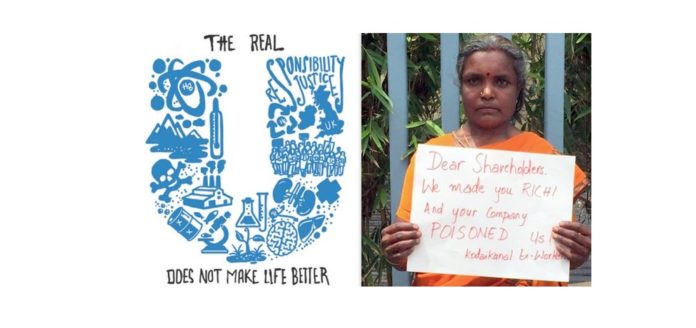
The Kodaikanal mercury disaster is one of the most infamous cases of the shirking of corporate social responsibility in India. The world’s third-largest consumer goods company and the largest producer of food spreads, Unilever, is accused of poisoning Kodaikanal — a popular hill station about 530 km from Chennai — due to the dumping of toxic waste by Unilever’s (now closed) thermometer factory.
According to a report by The News Minute, the thermometer factory, owned by Ponds, was moved from the US to Kodaikanal in 1983 and was acquired by Unilever. The factory dumped its toxic waste in waters, shrubs and forests of Kodaikanal and was later shut down after a dumpsite containing 7.4 tons of toxic waste, consisting of crushed thermometers, was found in 2001.
The 7.4 ton stockpile of crushed mercury-containing glass was found in torn sacks, spilling onto the ground in a busy scrapyard located near a school. Despite the evidence, Hindustan Lever’s export marketing manager dismissed charges of indiscriminate dumping. Unilever maintained that their operations damaged neither the environment outside the factory, nor their workers’ health.
The company was ordered to shut down in 2001, after Palani Hills Conservation Council and Greenpeace exposed the company’s attempt to sell glass contaminated with mercury to a scrap dealer. However, that is not enough for residents, workers and environmental groups who say that Unilever still has a lot of answering to do. Health remediation, financial compensation for workers, environmental clean-up and an apology to the community are their key demands to Unilever.
Sofia Ashraf, a Chennai-based rapper, released a video entitled “Kodaikanal Won’t” in August of 2015, asking Unilever to, “clean up their mess.” Set to Nicki Minaj’s “Anaconda,” the video took an undisguised jab at Unilever for its failure to clean up mercury contamination, or compensate workers affected by its thermometer factory in Kodaikanal.
Is a viral rap video forcing @Unilever and @PaulPolman to finally deliver justice for the workers of Kodaikanal? http://t.co/kOOwwuPxwX
— Daniele Taverna (@DanieleTaverna) September 24, 2015
In the past, protests and demonstrations by the victims and activists could not reach a large audience… at least, not the way the video jab has. After the video was shared by celebrities, including Nicki Minaj, and picked by mainstream media, including The New York Times, Unilever CEO Paul Polman promised a speedy resolution of the twin legacies of rehabilitating affected ex-workers and cleaning up the contaminated environment. Unilever published a response on its website stating that they, “continue to take this issue very seriously and it’s one we are keen to see resolved.” But activists have punched holes in the reply calling it “insincere” and “inaccurate.”
#WontBuyUnilever until @PaulPolman cleans up & compensates Kodaikanal; includes all the following brands http://t.co/c70TTBanfu — Maayan Bianca Cohen (@maayan_bianca) September 25, 2015
This is what has prompted Kodaikanal to launch the next phase of the campaign, wherein they are asking consumers and supporters to say they #WontBuyUnilever, and to register their protest by visiting jhatkaa.org/WontBuyUnilever or giving a call to 08880109020. Supporters are urged to sign a petition demanding that, “Paul Polman, CEO, Unilver Clean up Kodaikanal’s mercury pollution and compensate the workers,” via the public mobilization group, Jhatkaa.org.
This Article (Activists Up In Arms Against Unilever Accused Of Dumping Mercury In India’s Hill Station) is free and open source. You have permission to republish this article under a Creative Commons license with attribution to the author and AnonHQ.com.




